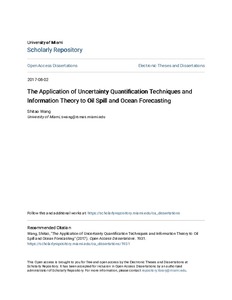The Application of Uncertainty Quantification Techniques and Information Theory to Oil Spill and Ocean Forecasting.

View/
Average rating
votes
Date
2017Author
Wang, Shitao
Status
Published
Metadata
Show full item recordAbstract
Quantifying uncertainties in ocean current forecasts is an important component of
formulating a response to an oil spill, e.g. to compute the anticipated oil trajectories.
Polynomial Chaos (PC) methods have recently been used to quantify uncertainties in
the circulation forecast of the Gulf of Mexico caused by uncertain initial conditions
and wind forcing data. The input uncertainties consisted of the amplitudes of perturbation
modes whose space-time structure was obtained from Empirical Orthogonal
Functions (EOF) decompositions. These e orts were the rst to rely on a PC approach
to e ciently quantify uncertainties in an ocean model, and as such have raised
a number of issues that we wish to address, namely the realism of the perturbations,
the e ective choices in choosing the uncertain variables, the information trade-o s of
the di erent uncertain input choices, and the ability to reduce these uncertainties if
observational data is available.
We explore whether these EOF-.....
Publisher
University of Miami (PhD Thesis)Coral Gables, Florida
Document Language
enSustainable Development Goals (SDG)
14.ABest Practice Type
Manual (incl. handbook, guide, cookbook etc)Citation
Wang, S. (2017) The Application of Uncertainty Quantification Techniques and Information Theory to Oil Spill and Ocean Forecasting. University of Miami, PhD Thesis, 118pp. (Open Access Dissertations 1931) DOI: http://dx.doi.org/10.25607/OBP-951Collections
 Repository of community practices in Ocean Research, Applications and Data/Information Management
Repository of community practices in Ocean Research, Applications and Data/Information Management